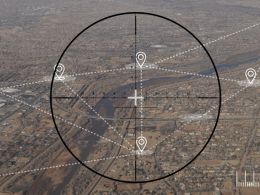
Sandia Labs to Enable Homeland Track Bitcoin Transactions
Sandia National Laboratories is working on a blockchain analysis tool that allows law enforcement agencies to track and crack down on illegal Bitcoin transactions. Bitcoin has always been pseudonymous at best. By design, the transparent nature of blockchain enables anyone to access transaction details using block explorers. However, tracking the entire transaction history of any Bitcoin token is a cumbersome task at the moment. A tool currently under development at the Sandia National Laboratories may make it easier to track Bitcoin transactions. Once completed, the tool is expected to....
Related News
The Sandia National Laboratories, a major United States Department of Energy research and development facility, with campuses in Albuquerque, New Mexico and Livermore, California, managed and operated by the Sandia Corporation (a wholly owned subsidiary of Lockheed Martin), is joining the war on Bitcoin anonymity. Sandia researchers have created a set of requirements for an analysis tool that can be used to fight the use of bitcoin by criminals. The Department of Homeland Security (DHS) Science and Technology (S&T) directorate requested that Sandia set up a graphical user interface or....
The U.S. Department of Homeland Security (DHS) Science and Technology (S&T) directorate is backing Sandia research with the creation of an analysis tool designed to overcome bitcoin challenges to assist law enforcement. As bitcoin becomes an increasingly accepted form of payment in our day-to-day lives, law enforcement are realizing that they need to utilize innovative approaches that will aid them in their money-laundering and cyber theft investigations. However, their number one priority is to reduce the time spent on tracking illegal operations. According to lead researcher for....
A federally funded research lab run by Lockheed Martin is developing a bitcoin analytics tool for the US Department of Homeland Security (DHS). The project, first detailed in a 19th August newsletter published by Sandia National Laboratories, marks a continuation of previously detailed efforts at the DHS. The project is being funded by the DHS Science and Technology Directorate, which late last year issued a call for blockchain research. Thus far, the bitcoin project appears to be in the early stages – Sandia has reportedly created a set of "requirements" for an analysis tool and....
Lead researcher of a group that says they have created an analysis tool for US law enforcement that can be used to overcome the challenges of criminals using Bitcoin for transactions has hinted that it could lead to greater Bitcoin adoption. Andrew Cox who is leading the work for Sandia, a US-Federally Funded Research and Development Center which has delivered essential science and technology to resolve most challenging security issues in the US for more than 60 years, said: “In many ways, figuring out how to effectively combat illicit Bitcoin commerce and reduce its perception as a tool....
Perhaps the most common way to track down deep web users is by infiltrating the marketplaces themselves. There have been a lot of question asked as to how law enforcement agencies can track down users on the deep web. As it turns out, there are nearly a dozen different methods which can be used to do so. Albeit the legality of these tricks remains doubtful, using Bitcoin is not a way to protect user privacy or anonymity by any means. Contrary to what most people may want to believe, law enforcement agencies can track Bitcoin users on the deep web. Even though this pseudonymous....





